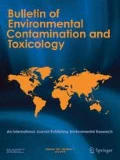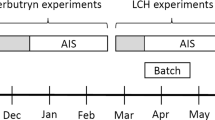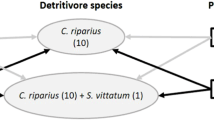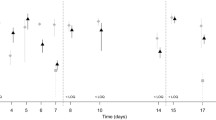Abstract
Systemic pesticides, such as the neonicotinoid imidacloprid, can be introduced into aquatic ecosystems through contaminated plant material, which is the basis for detrital (brown) aquatic food-webs. With the aim of exemplarily assessing for indirect effects on the level of predators, we first offered imidacloprid contaminated and uncontaminated alder leaves to the stonefly shredder Protonemura sp. for 72 h. Shredder survival, leaf decomposition, body length and biomass were all between 20% and 50% lower under imidacloprid exposure compared to uncontaminated conditions, indicating physiological implications. Subsequently, these shredders were provided as prey to stonefly predators (Isoperla sp.) kept in cages in a stream. Predator biomass and length decreased by up to 11% and 4.3%, respectively, when feeding on imidacloprid exposed prey. Our study hence suggests that plant material contaminated with systemic pesticides can exert adverse effects in aquatic predators when preying on shredders consuming such leaves, which warrants a further consideration of this pathway.


Similar content being viewed by others
References
Abelho M (2001) From litterfall to breakdown in streams: a review. Sci World J 1:656–680. https://doi.org/10.1100/tsw.2001.103
Alexander AC, Heard KS, Culp JM (2008) Emergent body size of mayfly survivors. Freshw Biol 53:171–180. https://doi.org/10.1111/j.1365-2427.2007.01880.x
Azevedo-Pereira HMVS, Lemos MFL, Soares AMVM (2011) Behaviour and growth of Chironomus riparius Meigen (Diptera: Chironomidae) under imidacloprid pulse and constant exposure scenarios. Water Air Soil Pollut 219:215–224. https://doi.org/10.1007/s11270-010-0700-x
Baas J, Kooijman SALM (2015) Sensitivity of animals to chemical compounds links to metabolic rate. Ecotoxicology 24:657–663. https://doi.org/10.1007/s10646-014-1413-5
Baxter CV, Fausch KD, Saunders WC (2005) Tangled webs: reciprocal flows of invertebrate prey link streams and riparian zones. Freshw Biol 50:201–220. https://doi.org/10.1111/j.1365-2427.2004.01328.x
Beketov M, Liess M (2008) Acute and delayed effects of the neonicotinoid thiacloprid on Seven Freshwater Arthropods. Environ Toxicol Chem 27:461–470. https://doi.org/10.1897/07-322R.1
Benton EP, Grant JF, Nichols RJ et al (2017) Risk assessment of imidacloprid use in forest settings on the aquatic macroinvertebrate community. Environ Toxicol Chem 36:3108–3119. https://doi.org/10.1002/etc.3887
Douglas MR, Rohr JR, Tooker JF (2015) Neonicotinoid insecticide travels through a soil food chain, disrupting biological control of non-target pests and decreasing soya bean yield. J Appl Ecol 52:250–260. https://doi.org/10.1111/1365-2664.12372
Englert D, Bakanov N, Zubrod JP et al (2017a) Modeling remobilization of neonicotinoid residues from tree foliage in streams: a relevant exposure pathway in risk assessment? Environ Sci Technol 51:1785–1794. https://doi.org/10.1021/acs.est.6b05213
Englert D, Bundschuh M, Schulz R (2012) Thiacloprid affects trophic interaction between gammarids and mayflies. Environ Pollut 167:41–46. https://doi.org/10.1016/j.envpol.2012.03.024
Englert D, Zubrod JP, Link M et al (2017b) Does waterborne exposure explain effects caused by neonicotinoid-contaminated plant material in aquatic systems? Environ Sci Technol 51:5793–5802. https://doi.org/10.1021/acs.est.7b00827
Englert D, Zubrod JP, Pietz S et al (2017c) Relative importance of dietary uptake and waterborne exposure for a leaf-shredding amphipod exposed to thiacloprid-contaminated leaves. Sci Rep 7:1–10. https://doi.org/10.1038/s41598-017-16452-9
Ford CR, Vose JM, Daley M, Phillips N (2007) AGRO 186-Eastern Hemlock water use: implications for systemic insecticide application. Arboric Urban For 33:421–427
Gessner MO, Chauvet E, Dobson M (1999) A perspective on leaf litter breakdown in streams. Oikos 85:377. https://doi.org/10.2307/3546505
Hall RO, Wallace JB, Eggert SL (2000) Organic matter flow in stream food webs with reduced detrital resource base. Ecology 81:3445–3463. https://doi.org/10.1890/0012-9658(2000)081[3445:OMFISF]2.0.CO;2
Inostroza PA, Wicht AJ, Huber T et al (2016) Body burden of pesticides and wastewater-derived pollutants on freshwater invertebrates: method development and application in the Danube River. Environ Pollut 214:77–85. https://doi.org/10.1016/j.envpol.2016.03.064
Ippolito A, Todeschini R, Vighi M (2012) Sensitivity assessment of freshwater macroinvertebrates to pesticides using biological traits. Ecotoxicology 21:336–352. https://doi.org/10.1007/s10646-011-0795-x
Jackson MC, Loewen CJG, Vinebrooke RD, Chimimba CT (2016) Net effects of multiple stressors in freshwater ecosystems: a meta-analysis. Glob Chang Biol 22:180–189. https://doi.org/10.1111/gcb.13028
Jeschke P, Nauen R, Schindler M, Elbert A (2011) Overview of the status and global strategy for neonicotinoids. J Agric Food Chem 59:2897–2908. https://doi.org/10.1021/jf101303g
Kleinbaum DG, Klein M (2012) Survival analysis. Springer, New York
Kreutzweiser D, Good K, Chartrand D et al (2007) Non-target effects on aquatic decomposer organisms of imidacloprid as a systemic insecticide to control emerald ash borer in riparian trees. Ecotoxicol Environ Saf 68:315–325. https://doi.org/10.1016/j.ecoenv.2007.04.011
Meinzer FC, Bond BJ, Warren JM, Woodruff DR (2005) Does water transport scale universally with tree size? Funct Ecol 19:558–565. https://doi.org/10.1111/j.1365-2435.2005.01017.x
Morrissey CA, Mineau P, Devries JH et al (2015) Neonicotinoid contamination of global surface waters and associated risk to aquatic invertebrates: a review. Environ Int 74:291–303. https://doi.org/10.1016/j.envint.2014.10.024
OECD (2004) Test No. 211: Daphnia magna reproduction test. In: OECD guidelines for the testing of chemicals. OECD, Paris
Pestana JLT, Loureiro S, Baird DJ, Soares AMVM (2009) Fear and loathing in the benthos: responses of aquatic insect larvae to the pesticide imidacloprid in the presence of chemical signals of predation risk. Aquat Toxicol 93:138–149. https://doi.org/10.1016/j.aquatox.2009.04.008
Pinheiro J, Bates D, Saikat D et al (2016) nlme. Linear and nonlinear mixed effects models. R Foundation for Statistical Computing, Vienna
R Development Core Team R (2017) R: a language and environment for statistical computing. R Foundation for Statistical Computing, Vienna
Rosi-Marshall EJ, Wallace JB (2002) Invertebrate food webs along a stream resource gradient. Freshw Biol 47:129–141. https://doi.org/10.1046/j.1365-2427.2002.00786.x
Rubach MN, Baird DJ, Van den Brink PJ (2010) A new method for ranking mode-specific sensitivity of freshwater arthropods to insecticides and its relationship to biological traits. Environ Toxicol Chem 29:476–487. https://doi.org/10.1002/etc.55
Schmidt-Kloiber A, Hering D (2015) www.freshwaterecology.info: an online tool that unifies, standardises and codifies more than 20,000 European freshwater organisms and their ecological preferences. Ecol Indic 53:271–282. https://doi.org/10.1016/j.ecolind.2015.02.007
Schneider CA, Rasband WS, Eliceiri KW (2012) NIH image to ImageJ: 25 years of image analysis. Nat Methods 9:671–675
Schulz R, Bundschuh M, Gergs R et al (2015) Review on environmental alterations propagating from aquatic to terrestrial ecosystems. Sci Total Environ 538:246–261. https://doi.org/10.1016/j.scitotenv.2015.08.038
Simon-Delso N, Amaral-Rogers V, Belzunces LP et al (2015) Systemic insecticides (Neonicotinoids and fipronil): trends, uses, mode of action and metabolites. Environ Sci Pollut Res 22:5–34. https://doi.org/10.1007/s11356-014-3470-y
Stampfli NC, Knillmann S, Liess M et al (2013) Two stressors and a community: effects of hydrological disturbance and a toxicant on freshwater zooplankton. Aquat Toxicol 127:9–20. https://doi.org/10.1016/j.aquatox.2012.09.003
Tattar TA, Dotson JA, Ruizzo MS, Steward VB (1998) Translocation of imidacloprid in three tree species when trunk- and soil-injected. J Arboric 24:54–56
Uhl P, Bucher R, Schäfer RB, Entling MH (2015) Sublethal effects of imidacloprid on interactions in a tritrophic system of non-target species. Chemosphere 132:152–158.
Wiggins G, Benton E, Grant J et al (2018) Short-term detection of imidacloprid in streams after applications in forests. J Environ Qual 47:571. https://doi.org/10.2134/jeq2017.11.0446
Zuur AF, Ieno EN, Walker NJ et al (2009) Mixed effects models and extensions in ecology with R. Springer, New York
Acknowlegement
This study and E.L-F. were funded by the German Research Foundation (DFG; Grant No.: SCHA1720/11-1 & SCHU2271/13-1). D.E. received funding through a scholarship of the German Federal Environmental Foundation (Deutsche Bundesstiftung Umwelt). The authors thank the anonymous reviewers and editors for their comments on earlier versions of the manuscript.
Author information
Authors and Affiliations
Corresponding author
Additional information
Editor’s Note: The paper by Lima-Fernandes et al. that appears in this issue describes the results of a multi-tiered study designed to evaluate the effects of the systemic pesticide imidocloprid on stream-dwelling invertebrates. In this study, detritivorous stoneflies were fed imidacloprid-contaminated leaves from a previous study in a static laboratory exposure. Survivors were fed to predatory stoneflies housed in situ, which resulted in reduced predator biomass and length. The paper did not fully satisfy the requirements of BECT; it lacks adequate documentation of exposure concentrations, and control survival in the laboratory phase of the study was comparatively poor. It was nevertheless accepted as a “Concept Note” due to the novel nature of the study and because it calls attention to the potential hazards of systemic pesticides in detrital stream communities.
Rights and permissions
About this article
Cite this article
Lima-Fernandes, E., Bundschuh, M., Bakanov, N. et al. Effects of a Systemic Pesticide Along an Aquatic Tri-Trophic Food Chain. Bull Environ Contam Toxicol 103, 507–514 (2019). https://doi.org/10.1007/s00128-019-02696-w
Received:
Accepted:
Published:
Issue Date:
DOI: https://doi.org/10.1007/s00128-019-02696-w




